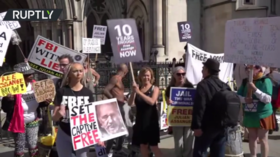Assange extradition: US allowed to challenge key psychiatric evidence in bid to reverse UK refusal to hand him over
The High Court in London has allowed the US to challenge a psychiatric evaluation of Julian Assange, which was key in an earlier court ruling refusing Washington’s request to extradite him for trial.
Wednesday’s appeal proceeding is the latest development in the continuing effort by the US to extradite Assange to stand trial on American soil for alleged computer-related crimes.
A British judge refused the request in January on humanitarian grounds, ruling that there was a high risk of Assange taking his own life if she agreed to his extradition. Testimonies by psychiatrist Michael Kopelman about the poor state of the Australian’s mental health were crucial in the case.
The US was allowed to challenge the ruling of the District Court on three points and wanted to pursue two further arguments. One of their extra lines of attack, which was granted by Lord Justice Tim Holroyde, was to seek the dismissal of Kopelman’s testimonies, due to the fact that he initially concealed Assange’s relationship with Stella Moris and the fact that they had two children together.
Clair Dobbin, who represents the US side, argued that the professor had misled the court and that his opinion about Assange’s state of mind should have been dismissed by Judge Vanessa Baraitser.
The name of Assange’s partner was not public at the time of Kopelman’s initial testimony, but it became known before the ruling was passed. The expert witness for the defense did report Assange’s fatherhood, and said when pressured by the US side during the extradition hearings that he didn’t disclose Moris’ identity out of respect for her privacy. Judge Baraitser decided when rejecting the extradition request that although Kopelman did mislead the court, he didn’t fail in his role as an impartial witness.
Edward Fitzgerald, who represents Assange, argued against the challenge, saying concern for family safety was natural in his situation. He recalled that a Spanish private security firm hired to spy on Assange allegedly snatched a diaper from his baby son to test his DNA and identify the child’s parents. The baby boy was regularly brought by an associate of Assange to visit him at the Ecuadorian Embassy in London, where he was staying for seven years to avoid extradition proceedings. The firm is suspected to have worked on behalf of the US government, and its alleged activities were cited extensively before Judge Baraitser.
Dobbin is replying to the defense and says, to the idea that there was concern about the safety of Assange's family, that certainly went "by the wayside" for Assange when he published leaked information. #AssangeHearing
— Kevin Gosztola (@kgosztola) August 11, 2021
According to some reports, Dobbin responded to Fitzgerald by saying that Assange’s concern for family went “by the wayside” when he published secret information leaked to him. The US accusations against the co-founder of WikiLeaks date back to more than a decade ago, when his organization revealed details of unsavory actions by US troops in Iraq and Afghanistan, based on material provided by whistleblower Chelsea Manning. His romantic relationship with Moris reportedly developed only after he got stranded at the Ecuadorian Embassy in 2012. WikiLeaks continues its publishing operation even with Assange held in British custody.
The US justice charged Assange with crimes related to hacking, but his supporters say he did nothing beyond what any responsible publisher would do to protect his sources. Since the request to extradite him was denied, a key witness on the US side has come forward to acknowledge that he fabricated his testimony against Assange.
Also on rt.com Snowden declares 'end of case against Julian Assange' after newspaper reveals LIES by key witness in US extradition caseAssange remains locked up at Britain’s top-security Belmarsh prison, which is normally reserved for dangerous violent criminals. The hearing on the US appeal against Britain’s refusal to extradite him has been tentatively scheduled for October.
Think your friends would be interested? Share this story!













